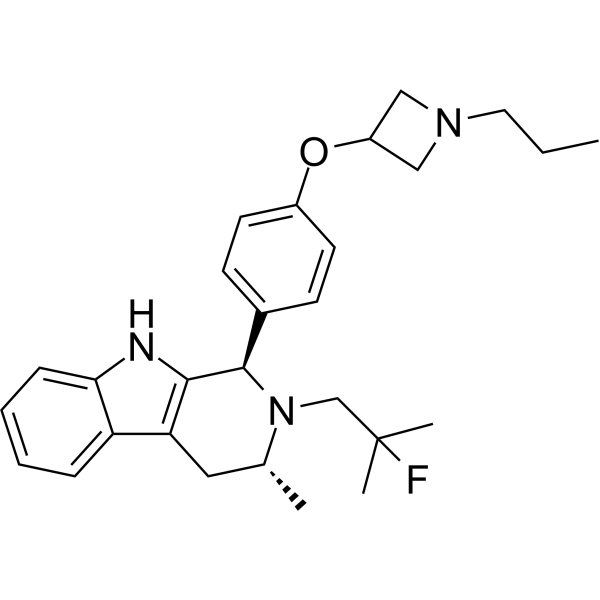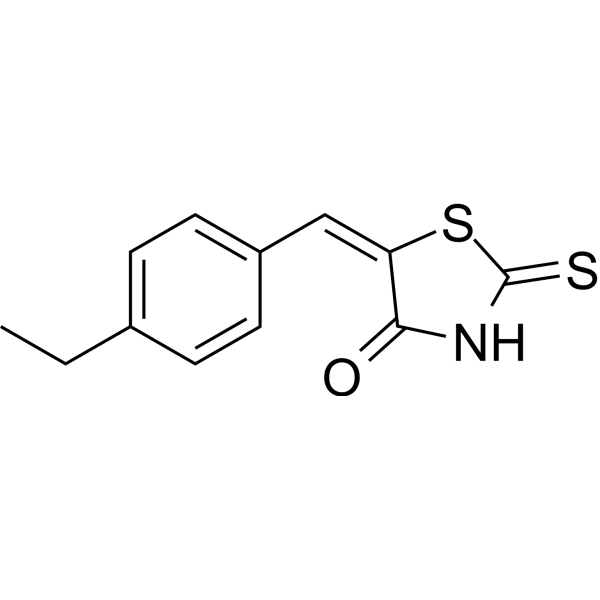 To enhance service speed and avoid tariff delays, we've opened a US warehouse. All US orders ship directly from our US facility.
To enhance service speed and avoid tariff delays, we've opened a US warehouse. All US orders ship directly from our US facility.
| Cat. No. | Product Name | Field of Application | Chemical Structure |
|---|---|---|---|
| DC78644 | Comtifator |
Comtifator (Example 77) is a modulator of the integrated stress response pathway. Comtifator can be studied in research for diseases associated with integrated stress response.
More description
|

|
| DC78643 | SB-219994 |
SB-219994 is a peroxisome proliferator-activated receptors (PPARs) agonists. SB-219994 can inhibit airway neutrophilia and associated chemoattractants/survival factors. SB-219994 exhibits anti-inflammation effec.
More description
|

|
| DC78590 | CIMBA hydrochloride |
CIMBA hydrochloride is a selective G protein-coupled estrogen receptor (GPER) antagonist. CIMBA hydrochloride is used in the research of cholesterol gallstones in women.
More description
|

|
| DC78583 | CD-10 |
CD-10 is an orally active and BBB-penatrable Keap1-Nrf2 protein-protein interaction (PPI) inhibitor. CD-10 binds to Keap1 with a KD value of 193 nM. CD-10 exhibits potent anti-oxidative and anti-inflammatory effects through Keap1-Nrf2 pathway activation, evidenced by reduced levels of MDA, IL-4, IL-10 and increased expression of HO-1. CD-10 effectively alleviated anxiety and depressive behaviors and restored serum neurotransmitter levels by promoting Nrf2 nuclear translocation in the chronic unpredictable mild stress (CUMS) mouse model. CD-10 can be used for the study of depression.
More description
|

|
| DC78551 | PeS-9 |
PeS-9 is an Androgen Receptor (AR) degrader that induces androgen receptor degradation PeS-9 induces mitochondrial and ER stress by promoting cytotoxic ROS production, leading to the release of mitochondrial cytochrome C and AIF. PeS-9 subsequently activates caspases-9 and -3, causing DNA fragmentation and apoptotic cell death. PeS-9 has anticancer activity against prostate cancer and exerts in vivo antitumor and antimetastatic activity with minor side effects. PeS-9 can be used for the study of targeting monotherapy against GLUT-1-overexpressing tumors.
More description
|

|
| DC78531 | PQ32 |
PQ32 is an antitumor agent that targets c-MYC Pu27 and KRAS G-quadruplexes. PQ32 inhibits tumor cell proliferation, arrests the cell cycle at the G2 phase, and induces apoptosis. PQ32 inhibits the expression of c-MYC and KRAS genes. PQ32 can inhibit tumor growth in mice and is used in the study of lymphoma, breast cancer, lung cancer, hepatocellular carcinoma, colorectal cancer, and other cancers.
More description
|

|
| DC78486 | AMG-34 |
AMG-34 is a GCN2-targeting agent with IC50 values of 0.395 μM, 0.010 μM, 1.07 μM and > 10 μM for GCN2, PERK, HRland PKR, respectively.
More description
|

|
| DC78448 | VSP-77 |
VSP-77 is an orally active PPARγ agonist. VSP-77 selectively upregulates the expression of insulin sensitivity-related genes (Glut4 and Adiponectin) by inhibiting CDK5-mediated phosphorylation of PPARγ at Ser-273. VSP-77 significantly improves glucose tolerance, reduces fasting blood glucose and insulin levels in high-fat diet (HFD)-induced diabetic mouse models. VSP-77 can be used for the study of diabetes.
More description
|

|
| DC78360 | 8(9)-EET |
8(9)-EET is a major cytochrome P450 (CYP450) metabolite in the renal cortex[1][2]. It activates PPARα in HEK293 cells when used at a concentration of 1 μM but inhibits NF-κB activity induced by IL-1β in a PPARα-dependent and -independent fashion. It is also a substrate of COX-1 and COX-2, as measured by oxygen consumption and product formation assays when used at a concentration of 50 μM .
More description
|

|
| DC78290 | 14-3-3σ/ERα stabilizer-2 |
14-3-3σ/ERα stabilizer-2 (Compound 41) is a covalent 14-3-3σ/ERα stabilizer with a Kd of 10.1 nM. 14-3-3σ/ERα stabilizer-2 significantly decreases the dissociation rate of ERα, stabilizing the binary ERα/14-3-3σ interaction. 14-3-3σ/ERα stabilizer-2 can be used for molecular glues research.
More description
|

|
| DC78281 | Deutaleglitazar |
Deutaleglitazar (Aleglitazar-d2) is a agonist of dual peroxisome proliferatory activating receptor (PPARα and PPARγ).
More description
|

|
| DC78278 | IA107 |
IA107 is a potent, selective, and allosteric IRE1α RNase (IC50 = 16 nM (non phosphorylated), IC50 = 9 nM (phosphorylated)) inhibitor. IA107 can inhibit endoplasmic reticulum stress-induced XBP1 mRNA splicing and protein expression, and has no cytotoxicity.
More description
|

|
| DC78272 | Y502-2304 |
Y502-2304 is a c-Myc G-quadruplex stabilizer. Y502-2304 exhibits potent antiproliferative activity in multiple myeloma (MM) cells. Y502–2304 downregulates c-Myc mRNA and protein expression. Y502-2304 induces apoptosis in MM cells, characterizes by elevated γH2AX levels, increases reactive oxygen species (ROS) generation, and mitochondrial dysfunction. Y502-2304 significantly inhibits tumor growth in a xenograft MM model. Y502-2304 can be used for the study of multiple myeloma.
More description
|

|
| DC78231 | SB-T-1214 |
SB-T-1214 (SBT) is a taxane. SB-T-1214 efficiently inhibits expression of stem cell-related genes (Oct4, Sox2, and c-Myc) and induces apoptosis of colon cancer spheroids with drug resistant tumorigenic CD133+/CD44+ cells. SB-T-1214 strongly represses tumor growth in Pgp+ DLD-1 human colon tumor xenografts mice model. SB-T-1214 can be used for antitumor research, especially against tumors with drug resistance, such as colon, pancreatic and renal cancers.
More description
|

|
| DC78203 | NVS2.1 |
NVS2.1 is a potent, orally active and brain-penetrant readthrough promoter. NVS2.1 triggers the degradation of eRF1 by activating the ribosome-related quality control pathways (involving GCN1, RNF14, and RNF25), thereby facilitating the reading through of premature termination codons. NVS2.1 can be used for the research of genetic diseases caused by nonsense mutations.
More description
|

|
| DC78199 | CF-Carvacrol |
CF-Carvacrol is an orally active lipid-lowering agent synthesized by merging the pharmacophores of Carvacrol and Clofibric acid. CF-Carvacrol has a good affinity for PPAR-α. CF-Carvacrol has significant hypolipidemic activity and may exert antioxidant and anti-inflammatory activity by activating the Nrf2/HO-1 signaling pathway to reduce liver injury. CF-Carvacrol can be used for the study of CF-induced liver damage.
More description
|

|
| DC78166 | GW-9820 |
GW9820 is PPARα and PPARγ activator (EC50s: 0.37 μM for PPARα; 0.288 μM for PPARγ). GW9820 increases CLA-1. GW9820 can be used in the research of atherosclerosis.
More description
|

|
| DC78163 | AZD9496-O-C3-O-C3-O-C-acid |
AZD9496-O-C3-O-C3-O-C-acid is a Target Protein Ligand-Linker Conjugate that incorporates a ligand for ERα and a PROTAC linker, which recruits E3 ligases. AZD9496-O-C3-O-C3-O-C-acid can be used for synthesis of PROTAC AZ'6421.
More description
|

|
| DC78158 | ZLN005 hydrochloride |
ZLN005 (hydrochloride) is a peroxisome proliferator-activated receptor-g coactivator-1a (PGC-1α) activator. ZLN005 (hydrochloride) can stimulate the expression of PGC-1α and downstream genes in skeletal muscle cells, improve glucose utilization and fatty acid oxidation. ZLN005 (hydrochloride) can increase the transcription of PGC-1α and downstream genes in skeletal muscle of diabetic db/db mice, increase fat oxidation and improve glucose tolerance, pyruvate tolerance and insulin sensitivity.
More description
|

|
| DC78104 | AR ligand-44 TFA |
AR ligand-44 TFA is an androgen receptor ligand that can be used in the synthesis of PROTACs, such as ARD-2051.
More description
|

|
| DC78103 | AR ligand-44 |
AR ligand-44 is an androgen receptor ligand that can be used in the synthesis of PROTACs, such as ARD-2051.
More description
|

|
| DC78084 | NKS-01 |
NKS-01 is a selective estrogen receptor modulator. NKS-01 can be used for the research of cancer, such as estrogen receptor-positive breast cancer.
More description
|

|
| DC78057 | Telapristone acetate |
Telapristone acetate (CDB-4124) is a potent progesterone receptor (PR) modulator. Telapristone acetate inhibits the proliferation of ovarian cancer cells by inducing cell cycle arrest and apoptosis. Telapristone effectively inhibits the occurrence and development of spontaneous and chemically induced mammary tumors in rats. Telapristone acetate can be used for breast and ovarian cancer research[1][2].
More description
|

|
| DC78055 | Cholic acid-Glu |
Cholic acid-Glu is a derivative of Cholic acid. The abundance of Cholic acid-Glu is increased in Crohn’s disease. Cholic acid-Glu increases PXR activation and significantly increases the expression of the downstream PXR target gene Cyp3a11 in small intestinal organoid tissue.
More description
|

|
| DC78053 | NDC 1308 |
NDC 1308 is an estradiol analogue. NDC 1308 can bind estrogen receptor beta and inhibit cancer cell proliferation by blocking chromosome replication. NDC 1308 can be used for the research of cancer, such as breast cancer.
More description
|

|
| DC78052 | HMR-3339 |
HMR-3339 is a new selective estrogen receptor modulator. HMR-3339 reduces total cholesterol, low-density lipoprotein cholesterol, and homocysteine. HMR-3339 corrects bone alterations induced by ovariectomy.
More description
|

|
| DC78049 | EIDD-036 |
EIDD-036, is the blood-brain barrier penetrant C-20 oxime of Progesterone, that binds progesterone receptor (PR) with an IC50 of 171 nM. EIDD-036 is the active metabolite of EIDD-1723. EIDD-036 exhibits promising challenges for rapid administration in acute trauma. EIDD-036 can be used for the study of traumatic brain injury (TBI).
More description
|

|
| DC78047 | RU58668 |
RU58668 is a steroidal antiestrogen that can be used as a potent antiproliferative agent on MCF-7 cells. RU58668 has the potential for the breast cancer research.
More description
|

|
| DC72682 | Palazestrant Featured |
Palazestrant is an antiestrogen and antineoplastic agent. Palazestrant in combination with a HER2 inhibitor, works on ER+/HER2+ cancer.
More description
|

|
| DC7575 | 10058-F4 Featured |
10058-F4 is a c-Myc inhibitor that specificallly inhibits the c-Myc-Max interaction and prevents transactivation of c-Myc target gene expression.
More description
|

|